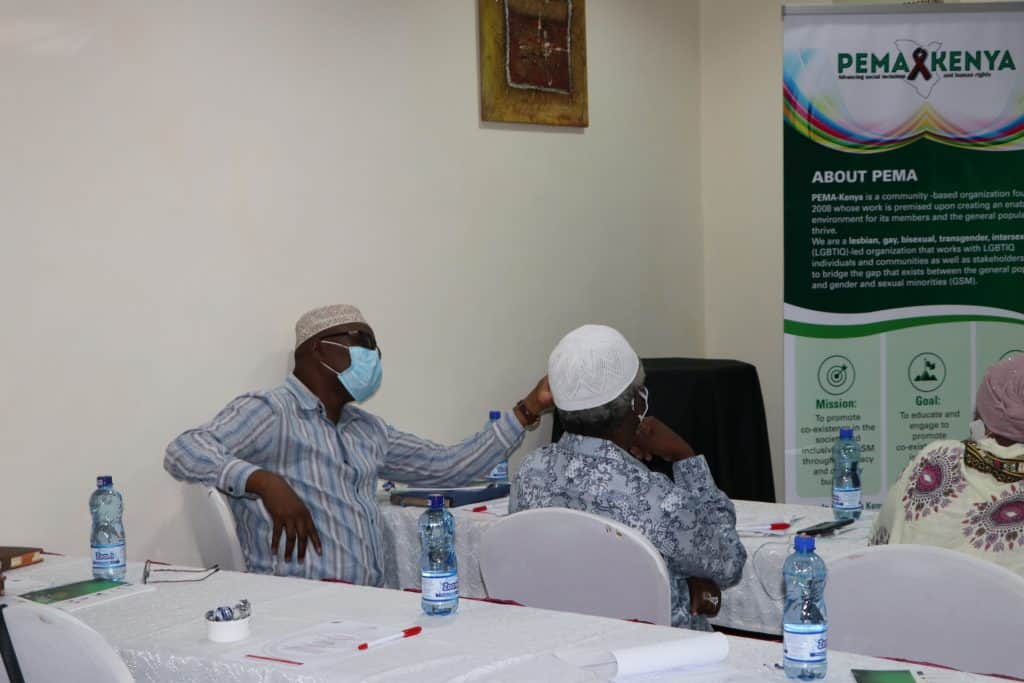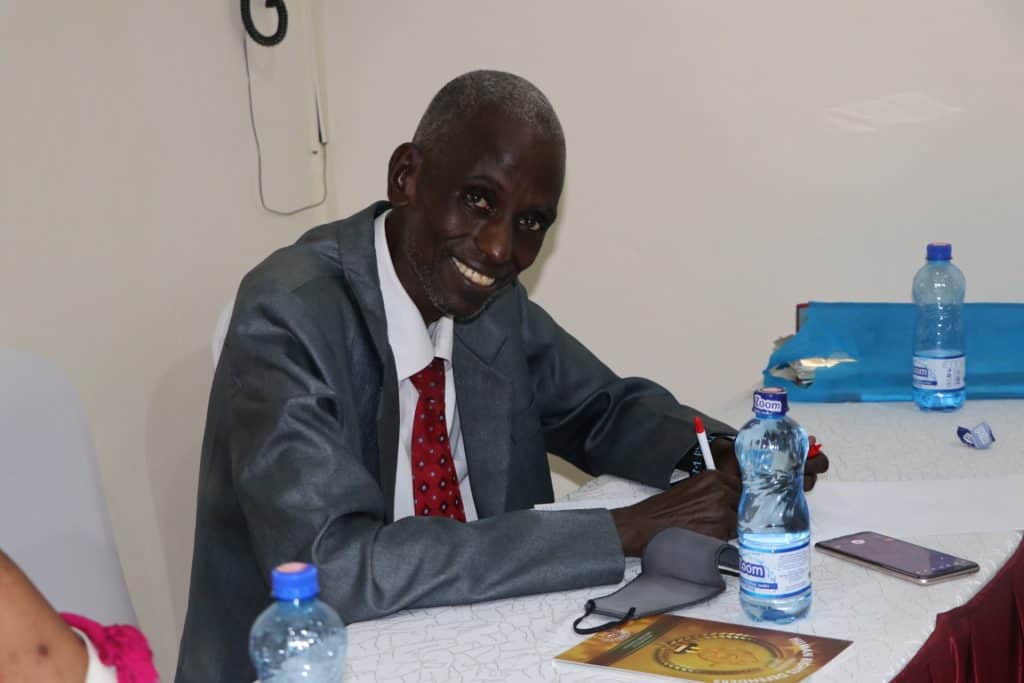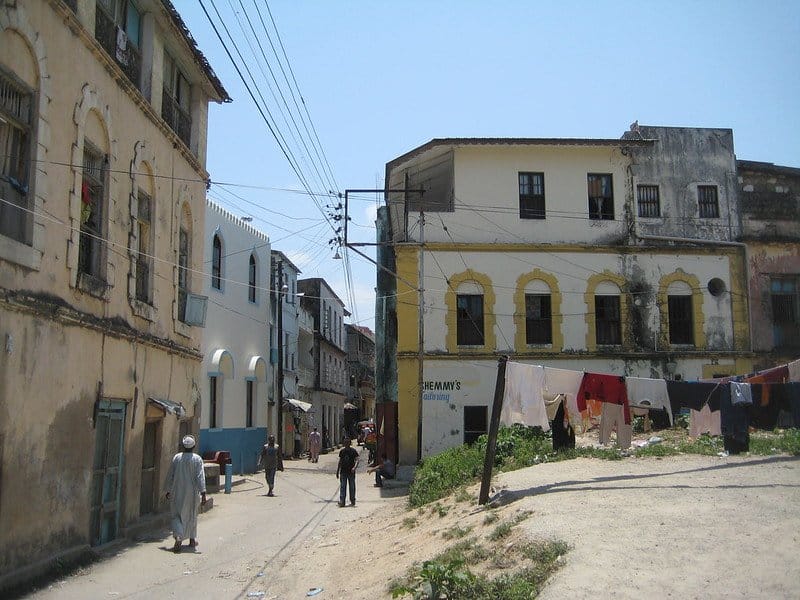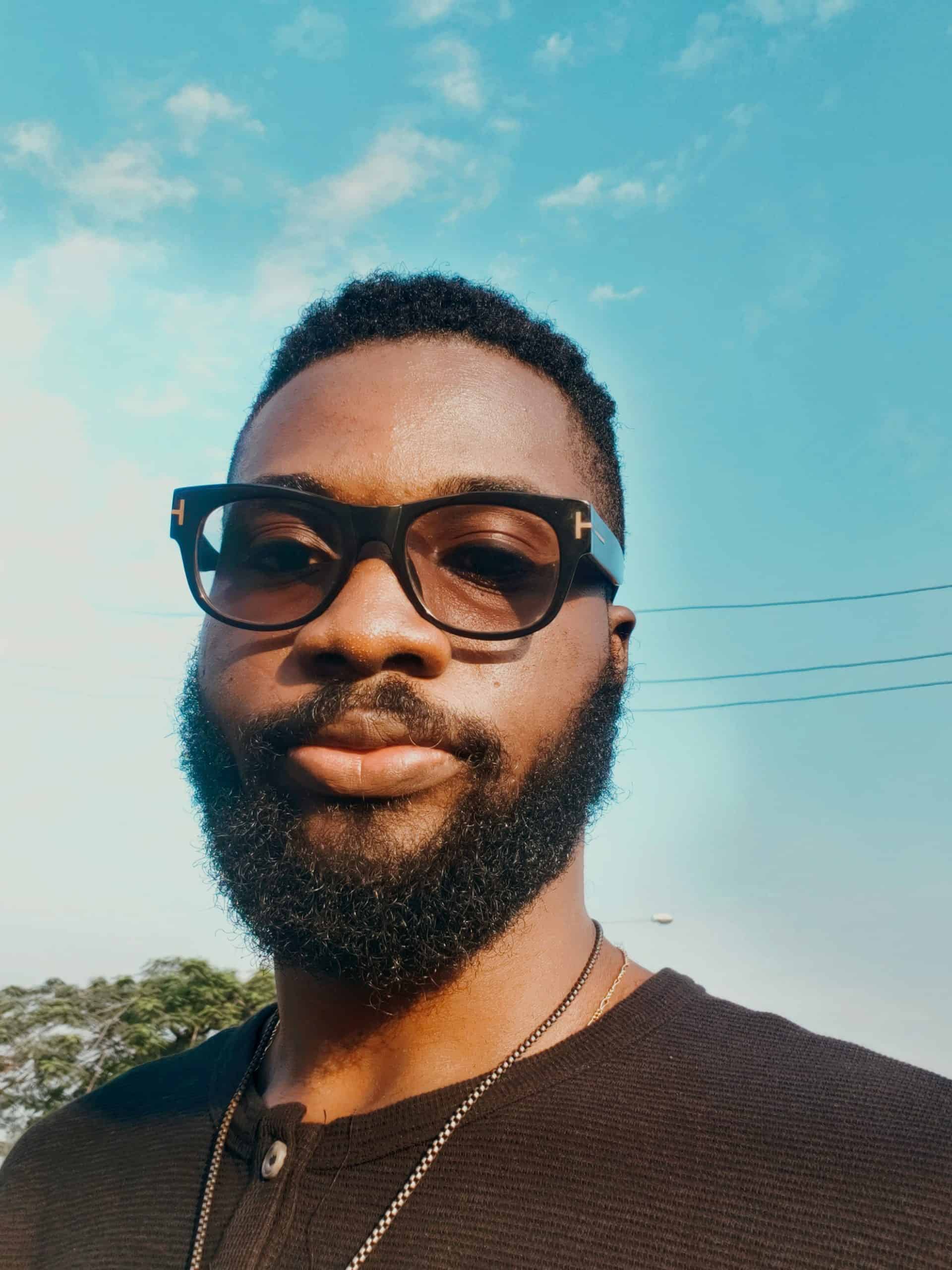Penda* did not feel worthy of a seat at the table with the 15 religious leaders she found herself nervously sitting across from, seven of them Christian, eight of them Muslim.
“Before I attended that forum, I knew that I was a sinner,” she recalls. “I didn’t think it was possible for me to go near a church. I didn’t even think that I could have a conversation with a religious leader.”
Yet in 2014, Penda, a masculine-presenting lesbian, found herself in conversation with these faith leaders, all of whom believed — and in many cases preached — that homosexuality is evil. But this was no ordinary conversation. At Penda’s side were three other people: a Kenyan gay man, a sex worker and someone living with HIV. None of the faith leaders knew these details. That information was held back — until just the right moment presented itself.
The forum was part of a strategic faith engagement session organized by Persons Marginalized and Aggrieved in Kenya (PEMA Kenya), a sexual and gender minority group in the coastal city of Mombasa. In Kenya, where the LGBTQ community is a frequent target of conservative religious leaders, who preach discrimination and sometimes even violence against them, PEMA Kenya takes an unusual approach: it works to “convert” faith leaders to the gay rights cause by introducing them to LGBTQ people, face to face, to build empathy, compassion and understanding.
The carefully orchestrated encounters require the utmost care — for all involved. “We don’t aim to ‘sensitize’ religious leaders,” says Lydia Atemba, a member of the faith engagement team. “We also prepare and equip our community to participate in dialogue with them. We try to bridge the gap on both sides.”
The most unlikely allies
The five-day event attended by Penda and the 15 religious leaders was ostensibly to discuss barriers to health care faced by marginalized people who have HIV. For the first three days of the forum, no explicit mention of homosexuality was uttered.
“We [then] brought other queer members into the sessions and they spoke with the religious leaders,” says Pastor McOveh, a queer pastor who helps to facilitate the program. (He requested his first name not be used.)
Penda was one of them. Now 44, she calmly shared her experience as a lesbian living in Mombasa. She had moved there in 2010, leaving behind the ruins of Kitale, a cosmopolitan town in Kenya that was struggling to recover from the 2007 election crisis. She described to them how she was verbally abused, and how she had been forced to sever ties with her spirituality because of faith leaders preaching anti-gay violence and discrimination.
“I have had troubles reconciling my sexuality and faith,” she told the group.

She says sharing her personal story was surprisingly effective. The faith leaders’ beliefs weren’t instantly transformed, but, she says, “I think I saw a lot of compassion in some of them.”
She was right. One of the conservative religious leaders in attendance that day was Pastor John Kambo. A pastor at the Independent Pentecostal Church of Kenya, Kambo was well known for his public attacks on the LGBTQ community. He once declared that “the gender and sexual minorities, especially in worship places, are cursed sinners and will go to hell.”
This wasn’t Kambo’s first PEMA session. The organization had been holding discussions with him for four years, gradually drawing him onto their side. “It was just follow-up meetings — continuous engagement overtime [to] change the way [he] sees things,” recalls Ishmael Bahati, PEMA Kenya’s executive director and co-founder. During this period, Kambo began reflecting on what the Bible says about love. According to transcripts from PEMA Kenya, he ultimately said that “continuous participation in these trainings opened my mind and I realized that we are all human beings.” The meeting with Penda was his last as an outsider — afterwards, he joined PEMA Kenya as an active, dedicated member, and remained one until his death last month.
In the end, Kambo became an unlikely friend to the queer community. He underwent PEMA’s Training of Trainers, which taught him how to carefully discuss LGBTQ concerns with his fellow faith leaders. But his conversion came at a price. He was excommunicated from the church for three years, and his marriage hit the skids. He continued to be an ally, however, and in 2018 he became the first religious leader to be nominated as a “Human Rights Defender” by the National Coalition of Human Rights Defenders — Kenya.
That same year, Kambo invited Pastor Benhadad Mutua Kithome to a PEMA discussion. “PEMA Kenya produced good notes, and they were helping us very much,” Kithome says of that meeting. “Some pastors were not agreeing with them — they were just agreeing with what the scriptures say. The way Sodom and Gomorrah was. The way, because of homosexuality, people were punished. But because of this training, some pastors, especially me, came to understand.”

Athumani Abdullah Mohammed, an Ustaz (Islamic teacher) whose view of queer people changed gradually after partaking in a PEMA session in 2018, had a similar experience.
“When I got a chance to engage, it was not easy because… I work with conservative organizations,” he says. “The whole gospel I was hearing was against ‘this people,’ as they called them. I thank my brother Ishmael because he was so persistent. He brought me on board. The funny thing is, the first meeting we held was not a good meeting. I was so against everything they were saying, but he saw something in me which I couldn’t see by myself. And he kept on engaging me. Now, I learned to listen and I opened myself to listen. I listen to what I want to hear — and what I don’t want to hear.”
Converting a culture
The coastal city of Mombasa is a conservative place. Religion is at its core, and local faith leaders wield outsized influence, often preaching violence against the queer community.
“Rhetoric vilifying LGBT people, much of it by religious leaders, is particularly pronounced on [Kenya’s] coast, and shapes public perceptions,” according to a Human Rights Watch report.
This was the environment into which PEMA Kenya launched in 2008. Started as a health and social wellbeing community for gay and bisexual men following the tragic death of a gay man in Mombasa — he became sick and was abandoned by his family — the group later expanded to accommodate other gender and sexual minority groups. Then, in 2010, a call to “flush out gays” by two major religious groups — the Council of Imams and Preachers of Kenya (CIPK) and the National Council of Churches of Kenya (NCCK) — led to a spate of attacks on queer people.
Crushed by negative news?
Sign up for the Reasons to be Cheerful newsletter.The violence became a catalyzing moment for PEMA Kenya. “We thought that it is a good time to have a dialogue with the religious leaders,” recalls Bahati, “to see if we can have a lasting solution for the attacks.”
The organization appears to be making progress toward that goal. Until five years ago, Bahati says, Ramadan, which concluded this month, was a particularly dangerous time for queer people in Kenya’s coastal region. A U.S. government report supports this observation, concluding that “the highest incidences of violence in the Kenyan Coast, which has a largely Muslim population, are reported during Ramadan.”
For this reason, organizations like PEMA used to focus on simply keeping LGBTQ people safe from harm during these weeks. “Most organizations were looking for funds to relocate people, to support people” during this period, says Bahati.
But this year’s Ramadan has been different. Attacks on queer folks are down, Bahati reports. “Things have really changed.” He believes PEMA’s years of meticulous relationship building are beginning to bear fruit. To date, PEMA has trained 619 religious leaders, 246 of which are still active members in the network. These members are crucial to spreading the acceptance of queerness in their congregations and communities in Mombasa and across Kenya. They also facilitate events alongside queer pastors and Ustaz, and review the group’s strategic faith engagement manual, Facing Our Fears.

According to Jide Macaulay, an openly gay British-Nigerian priest, the influence religious leaders hold over public perception makes them invaluable allies. In his experience, building radical queer institutions in a place like Mombasa just isn’t effective. This is something he learned first-hand — in 2006, Macaulay founded House of Rainbow, the first queer church in Nigeria. It was considered an affront to the societal and religious norm, and met with hostility. It lasted only two years.
“My largest focus was on the [queer] community, not necessarily on the rest of the society,” he says. “We didn’t take time to educate the society. House of Rainbow would have benefitted if we had allies within the community. [It] would have benefitted if we started maybe as a support group rather than a full-blown church.”
Now, like PEMA Kenya, House of Rainbow has evolved to make engagement with Christian and Islamic faith leaders the core of its mission, holding forums in Malawi, Zambia, the Democratic Republic of Congo, South Africa, Lesotho, Botswana, Zimbabwe and Ghana.
What the scriptures say
Bahati’s expertise as an Islamic scholar comes in handy. For instance, he notes that the role of language is key to winning converts to an inclusive community.
During PEMA’s strategic meetings, faith leaders are introduced, carefully and tactfully, to humanizing language. “You see, the word homosexual, lesbian, gay, bisexual, transgender, queer are not bad words,” says Macaulay. “Society has made them scary.” PEMA’s facilitators explain appropriate usage, context and meanings, and the harmful implications of using such language as slurs.
“What we say is that language is not innocent,” says McOveh, the gay pastor. “Most of the time we realize that faith leaders use language unknowingly.”
Of course, simply teaching more sensitive language is only the first step. In the Bible and Quran, certain verses and stories are still used to justify homophobic slurs and attacks.
“You realize that scriptures have different interpretations,” says McOveh, “so we try to find common ground to tell them that, see, there is this which is provided by the religion and this which is given as perception.” Macaulay echoes this point. “Looking at the Bible, there’s a history of bad theology, mistranslation, and that mistranslation has caused many churches not to understand that homosexuality is not a sin. Homosexuality is not like robbery or theft. Homosexuality is like being Black. Homosexuality is like being albino. There are things that you just cannot change…Homosexuality is not a crime and it should never be criminalized.”
While groups like PEMA Kenya and House of Rainbow have battled systemic homophobia in society, their efforts are still “a drop of water in the ocean,” says Macaulay.
Homosexuality remains illegal in Kenya. The Penal Code explicitly criminalizes it, and a conviction can carry a prison sentence of up to 14 years. Petitions filed in Nairobi and Mombasa high courts in 2019 to rule these laws unconstitutional were both dismissed this year. Appeals have been filed, but according to Michael Kioko, a lawyer and LGBTQ advocate, it would take a long time to get a ruling.
“We’ll have to wait for years to see whether the court of appeal will declare those provisions unconstitutional, and they may not,” he says.
32 out of 52 African countries criminalize same-sex relations, with punishment ranging from death to lengthy prison terms. In some ways, these laws lend legitimacy to perpetrators of homophobic violence and discrimination.
The pandemic has presented PEMA Kenya with yet another challenge. The delicate work of working with new religious leaders can be risky, and the discussions can only take place in a secure location, says Mohammed.
“You cannot talk to people about these things in their area,” he says. “You need to be very particular when it comes to safety because it’s a lot of voices which are talking against this and people are willing to kill.” Holding discussions with participants in an undisclosed location is safer, but it requires funding which PEMA has spent on taking care of needy community members during the lockdown.
Still, the efforts of PEMA Kenya’s faith leaders continue to foster a safer city for a lot of queer people in Mombasa — in the streets, in the churches and mosques, and in their own homes. “[Now] someone can walk for a kilometer without being attacked,” says Penda with relief. “Those were things that were not very much happening back then.”
*Name has been changed to protect the person’s identity.






